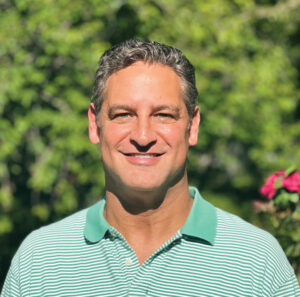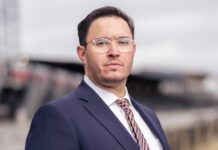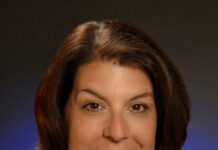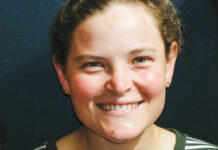
A synagogue merger offers the chance to craft a new identity.
That was the mission Dr. David Buchalter took on as president of Har Sinai-Oheb Shalom Congregation.
The 53-year-old orthopedic surgeon, who lives in Poplar Hill in North Baltimore, just stepped down from his two-year term with a sense of accomplishment.
“The largest thing that the synagogue achieved was we created a cohesive, unified community,” Buchalter said. “Sinai and Shalom are two of the oldest Reform congregations in the country. I became president right as the congregation had merged. So having our congregants feel that they’re a part of something very special and meaningful, I was able to help in this endeavor.”
One thing the new synagogue of 500 families needed was a name.
“It could be entirely new or a name that blended the names of the legacy congregations,” Buchalter said. “We had to go through a process by which all the congregants nominate a name and then voted on it. It was really that process that helped create community and the feeling that this congregation can achieve big things and take on big issues as one identity.”
Prior to his presidency, Buchalter served on the search committee for the inaugural rabbi.
Buchalter helped oversee the creation of committees and opportunities for people to gather and be involved.
“We did this through COVID, and we were able to begin to grow as a congregation and increase our membership,” he said.
Buchalter was born in Philadelphia and spent his youth in Memphis, Tennessee. His mother was Orthodox, and his father was “very Reform,” Buchalter said.
“I say that I am a Reform Jew, a proud Reform Jew by choice,” he said. “And the reason is that as much as I enjoyed Conservative Judaism and enjoyed going to Orthodox services, I was most influenced by the Reform movement.”
Beginning at age 9, Buchalter spent his summer at URJ Jacobs Camp, a Jewish Reform camp in Utica, Mississippi.
“That was the place where I really connected with Judaism, and it became something very personal and spiritual,” Buchalter recalled. “After my bar mitzvah at a Conservative congregation, I told my parents that I wanted to continue my Jewish education, but the only way I would was at the Reform Temple Israel in Memphis.
“It was because of the connections, the friendships I had made through the camp, that I became confirmed at Temple Israel and graduated from their high school program,” he added.
Buchalter also participated in NFTY, as well as the local Memphis and regional Southern chapters.
He likes the freedom offered by Reform Judaism, “the openness to a wide range of thoughts and spiritual practices,” he said.
“There’s the freedom to include as much tradition as you want, but the freedom to innovate, change and improve upon the age-old traditions,” he continued.
Buchalter has a wife, Allison, and two sons: Zachary, 20, and Dylan, 17. Allison Buchalter works for the nonprofit Thread, which helps Baltimore students navigate challenges through high school and young adulthood.
David Buchalter said he stays involved in the Jewish community because he feels connected to the Jewish people and community on a spiritual and social level.
“I was certainly busy enough with my professional and family life to not take on a leadership role such as temple president, but it really is a calling to me, something that I really felt compelled to do and to serve,” he said.
To keep synagogues relevant, Buchalter said, “it means expanding how we connect with one another. If traditionally we gathered and connected primarily in the synagogue, that’s wonderful and we should continue to do that, but we also need to convene everywhere that we are, all over the city, in people’s homes, the locations where younger people like to congregate.
“We have to consider what activities and interests that we have to attract people to the synagogue community. We need to expand and make sure that we are open to a wide range of people and that we make sure to promote and support diversity and inclusion in our synagogue communities.”







